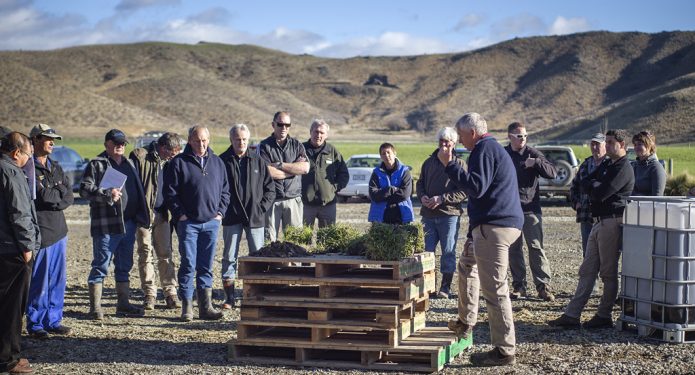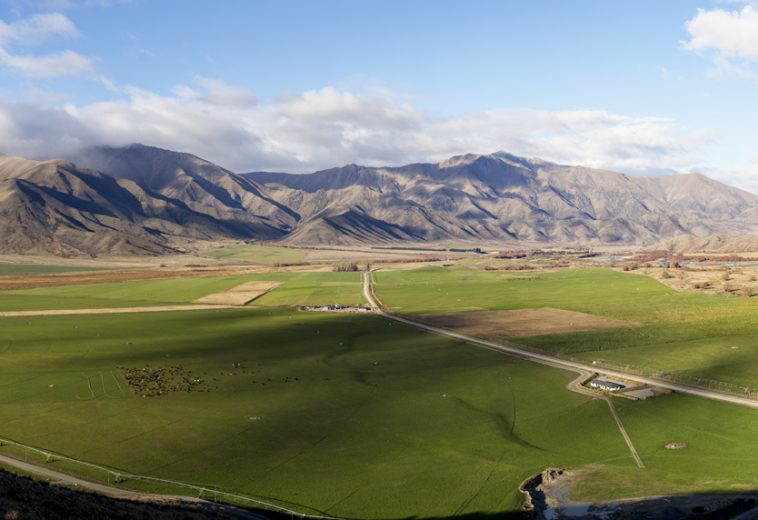You must be logged in to post a comment.
Archive

A group of South Island farmers have rallied together to improve their environmental practises and protect their land and waterways.
Environment Canterbury (ECAN) has declared the Upper Waitaki region a red zone because the nutrient levels in the Ahuriri River are too high.
At a farm field day organised by fertiliser and lime company, Hatuma Dicalcic Phosphate Ltd, ECAN told farmers in the Ahuriri Valley that the community wants to see clean water in local rivers and streams and farmers need to better manage their nutrient application.
ECAN’s Principal Land Management Advisor, Ian Lyttle commended hosting farmers, Merv McCabe and Richard Gloag for leading the way with their environmental farm practises, which includes using Hatuma’s non water soluble fertiliser.
“Merv and Richard are looking after their soil pH, managing their nutrient application and effluent to minimise nutrient loss.”
“One of the biggest concerns for the community is the leaching of nitrate and the effect this has on waterways. Phosphate is less soluble than other fertiliser and is mostly lost where soil particles and effluent enter water ways,” says Mr Lyttle.
Mr McCabe and Mr Gloag converted their 470 hectare property to dairy three years ago. The farm is situated beside the Ahuriri River and protected Department of Conservation land.
“We are very aware of our surrounding environment so we do everything possible to protect the river,” says Mr McCabe.
“We use Hatuma Dicalcic Phosphate which is just one way we reduce run off. It’s non water soluble so it sits on the land and is absorbed by the grass.”
It takes almost 300,000 litres of water to dissolve 100 kilos of Hatuma Dicalcic Phosphate, by comparison it takes just 4,160 litres to dissolve 100 kilos of superphosphate.
“Fertiliser that dissolves quickly is scary as you don’t know where it goes. You don’t want to lose what you are putting on for the sake of the environment and grass growth. Hatuma Dicalcic Phosphate has a double benefit because it stays in the paddocks and therefore helps protect our waterways,” says Mr McCabe.
The dairy farm’s production is well above the national average, producing 1690 milk solids per hectare and the farm’s fertiliser expenditure is cost effective. For the last two years the farm has met the red zone’s parameters for nutrient loss.
Environment Canterbury says many of the farms in the Upper Waitaki region have light soils with excellent drainage so they are more susceptible to leaching.
Mr McCabe says the property’s four water bores are independently tested three times a year for the Regional Council.
“We have to be environment conscious given the red zone. There is some need to change our practises so we had this field day to show farmers that we can grow good grass and follow the rules at the same time. You can protect the environment and be productive at the same time.”
Hatuma Marketing and Sales Manager, Aaron Topp says the company is working with a lot of farmers in the Ahuriri Valley to improve pasture quality and lower the nutrient levels in the Ahuriri River.
“Protecting the environment and improving water quality while maintaining production has been the first priority for Hatuma for the last fifty years. It is great to share this knowledge with farmers committed to doing the same.”



 520 Maharakeke Rd, Waipukurau
520 Maharakeke Rd, Waipukurau

 0800 80 65 65 /
06 858 8567
0800 80 65 65 /
06 858 8567 06 8588018
06 8588018
Leave a Reply